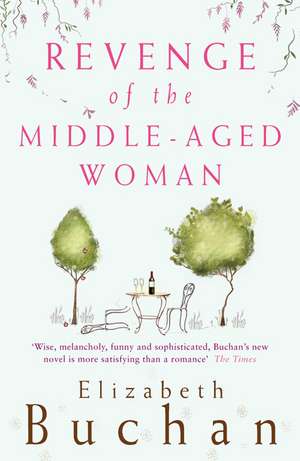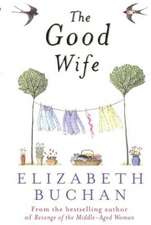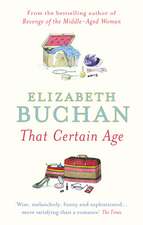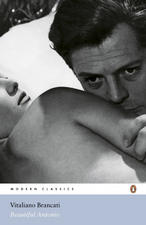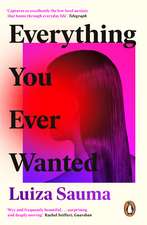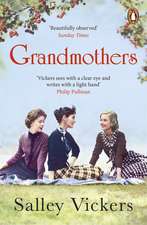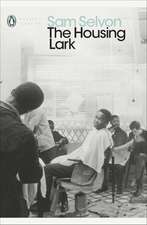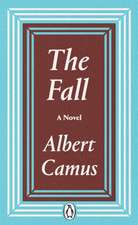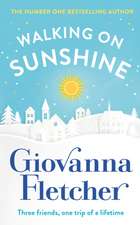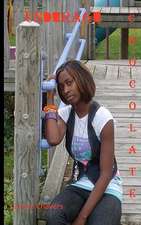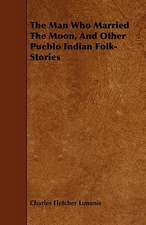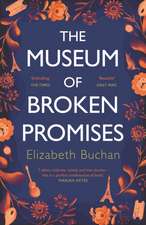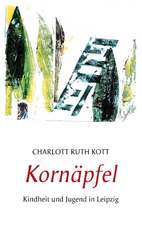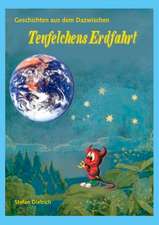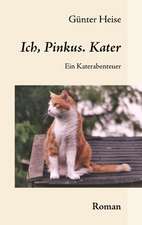Revenge of the Middle-Aged Woman
Autor Elizabeth Buchanen Limba Engleză Paperback – 27 mar 2002
Rose Lloyd was the last to suspect that Nathan, her husband of over twenty years, was having an affair, and that he was planning to leave her.
But the greatest shock was yet to come: his mistress was Rose's colleague and friend, Minty.
Left alone in their once-happy family home, where she and Nathan had brought up their children, Rose started thinking - about the man she'd married, and how well she really knew him. About the carefree yet studious girl she had been before she met him.
Twenty years ago she had to make the choice between two very different lives.
Could she now recapture what she nearly chose back then, a life where she put herself first?
Revenge of a Middle-Aged Womanis the compelling and heart-warming novel from bestselling author Elizabeth Buchan.
Praise for Elizabeth Buchan:
'Gorgeously well-written - funny, sad, sophisticated'Independent
'Beautifully observed, with the insight and humour that one has come to expect from the author'Times
'Compelling, compassionate, and aglow with moments of laugh-or-cry humour'Mail on Sunday
'Buchan is a cut above the rest'Sunday Mirror
| Toate formatele și edițiile | Preț | Express |
|---|---|---|
| Paperback (2) | 59.07 lei 25-31 zile | +21.100 lei 5-11 zile |
| Penguin Books – 27 mar 2002 | 59.07 lei 25-31 zile | +21.100 lei 5-11 zile |
| PENGUIN RANDOM HOUSE LLC – 30 dec 2003 | 124.64 lei 22-36 zile |
Preț: 59.07 lei
Preț vechi: 70.13 lei
-16% Nou
Puncte Express: 89
Preț estimativ în valută:
11.30€ • 11.83$ • 9.41£
11.30€ • 11.83$ • 9.41£
Carte disponibilă
Livrare economică 13-19 martie
Livrare express 21-27 februarie pentru 31.99 lei
Preluare comenzi: 021 569.72.76
Specificații
ISBN-13: 9780140290080
ISBN-10: 0140290087
Pagini: 384
Dimensiuni: 129 x 198 x 23 mm
Greutate: 0.27 kg
Editura: Penguin Books
Colecția Penguin
Locul publicării:London, United Kingdom
ISBN-10: 0140290087
Pagini: 384
Dimensiuni: 129 x 198 x 23 mm
Greutate: 0.27 kg
Editura: Penguin Books
Colecția Penguin
Locul publicării:London, United Kingdom
Notă biografică
Elizabeth
Buchan's
previous
novels
include
the
prizewinningConsider
the
Lily,theNew
York
TimesbestsellerRevenge
of
the
Middle-Aged
Woman,and
her
most
recent
bookThe
New
Mrs
Clifton,
which
was
a
Waterstones
Paperback
of
the
Year
in
2017.
Elizabeth's
short
stories
have
been
broadcast
on
BBC
Radio
4
and
published
in
a
range
of
magazines.
Elizabeth
reviews
for
theSunday
Timesand
theDaily
Mailand
is
a
patron
of
the
Guildford
Book
Festival
and
co-founder
of
the
Clapham
Book
Festival.
She
has
chaired
the
Betty
Trask
and
Desmond
Elliott
literary
prizes,
has
been
a
judge
for
the
Costa
Novel
Award,
and
she
sits
on
the
authors'
committee
for
the
Reading
Agency.
She
lives
in
London.
Recenzii
"This beautifully written novel about a discarded middle-aged wife brims with surprises."." —USA Today, in naming the 10 Best Books of 2003
"Wise and wonderful...Buchan celebrates the patience and wisdom that only
age can bring." —USA Today
“Bottom line: Get Revenge.” —People
“Revenge may be sweet, but Revenge is not, thank goodness.” —The Wall Street Journal
“What I like about this book is everything.” —Elizabeth Berg
"Wise and wonderful...Buchan celebrates the patience and wisdom that only
age can bring." —USA Today
“Bottom line: Get Revenge.” —People
“Revenge may be sweet, but Revenge is not, thank goodness.” —The Wall Street Journal
“What I like about this book is everything.” —Elizabeth Berg
Extras
'Here,' said Minty, my deputy, with one of her breathy laughs, 'the review has just come in. It's hilariously vindictive.' She pushed towards me a book entitled A Thousand Olive Trees by Hal Thorne with the review tucked into it.
For some reason, I picked up the book. Normally I avoided anything to do with Hal but I did not think it mattered this once. I was settled, busy, different, and I had made my choice a long time ago.
When we first discussed my working on the books' pages, Nathan argued that, if I ever achieved my ambition to become the books editor, I would end up hating books. Familiarity bred contempt. But I said that Mark Twain had got it better when he said that familiarity breeds not so much contempt but children, and wasn't Nathan's comment a reflection on his own feelings about his own job? Nathan replied, 'Nonsense, have I ever been happier?' and 'You wait and see'. (The latter was said with one of his lovely, strong-man I know-better-than-you smiles, which I always enjoyed.) So far, he had been wrong.
For me, books remained full of promise, and contained a sense of possibility, any possibility. In rocky times, they were saviours and lifebelts, and when I was younger they provided chapter and verse when I had to make decisions. Over the years of working with them, it had become second nature to categorize them by touch. Thick, rough, cheaper paper denoted a paperback novel. Poetry hovered on weightless and were decorated with wide white margins. Biographies were heavy with photographs and the secrets of this subjects' life.
A Thousand Olive Trees was slim and compact, a typical travelogue whose cover photograph was of a hard, blue sky and a rocky, isolated shoreline beneath. It looked hot and dry, the kind of terrain where feet slithered over scree, and bruises sprouted between the toes.
Minty was watching my reaction. She had a trick of fixing her dark, slightly slanting eyes on whoever, and of appearing not to blink. The effect was of rapt, sympathetic attention, which fascinated people and also, I think, comforted them. That dark, intent gaze had certainly comforted me many times during the three years we had worked together in the office.
'"This man is a fraud,'" she cited from the review.
'" And his book is worse . . ."'
'What do you suppose he's done to deserve the vitriol?' I murmured.
'Sold lots of copies,' Minty shot back.
I handed her A Thousand Olive Trees. 'You deal. Ring up his agent, Dan Thomas, and see if he'll do a quickie.'
'Not up to it. Rose?' She spoke slowly and thoughtfully, but with an edge I did not quite recognize. 'Don't you think you should be by now?'
I smiled at her. I liked to think that Minty had become a friend, and because she always spoke her mind I trusted her. 'No. It's not a test. I just don't wish to handle Hal Thorne's books.'
'Fine.' She picked her way round the boxes on the floor, which was packed with them, and sat down. 'Like you said, I know how to deal.' I am not sure she approved. Neither did I, for it was not professional behaviour to ignore a book, certainly not one that would receive a lot of attention.
My attention was diverted by the internal phone. It was Steven from Production. 'Rose, I'm very sorry but we are going to have to cut a page from Books for the twenty-ninth.'
'Steven!'
'Sorry, Rose. Can you do it by this afternoon?'
'Twice running, Steve. Can't someone else be the sacrificial lamb? Cookery? Travel?'
'No.'
Steven was harassed and impatient. In our business - getting a paper out - time dictated our decisions and our reactions. After a while, it became second nature, and we spoke to each other in a shorthand. There was never time for the normal give and take of argument. I glanced at Minty. She was typing away studiously, but she was, I knew, listening in. I said reluctantly, 'I could manage it by tomorrow morning.'
'No later.' Steven rang off.
'Bad luck.' Minty typed away 'How much?'
'A page.' I sat back to consider the problem, and my eye fell on the photograph of Nathan and the children, which had a permanent place on my desk. It had been taken on a bucket-and-spade holiday in Cornwall when the children were ten and eight. They were on the beach, with their backs to a grey, ruffled sea. Nathan had one arm round Sam, who stood quietly in its shelter, while the other restrained a squirming, joyous Poppy. Our children were as different as chalk and cheese. I had just mentioned that a famous novelist had also taken a house in Trebethan Bay for six months to finish a novel. 'Good heavens.' Nathan had made one of his faces. 'I had no idea he was such a slow reader.' I had seized the camera and caught the trio as the children howled with laughter at this latest example of his terrible jokes. Nathan was laughing, too, with pleasure and satisfaction. See? he was saying to the camera. We are a happy family.
I leant over and touched Nathan's face in the photograph. Clever, loving Nathan. He considered that the job of fatherhood was to keep his children so amused that they did not notice the unpleasant side of life until they were old enough to cope, but he also loved to make them laugh for the pleasure of it. Sometimes, at mealtimes, I had been driven to put my foot down: at best, Sam and Poppy's appetites were as slight as their bodies and I worried about them. 'Mrs Worry, do you not know that people who eat less are healthier and live longer?' demanded Nathan who, typically, had gone to some pains to find out this fact to soothe my fears.
Back to the problem. As always with the paper, there were political factors, none significant in isolation but, taken together, they could add up. I said to Minty, 'I think I'd better go and fight. Otherwise Timon might get into the habit of paring down Books. Don't you think?' The 'don't you think' was cosmetic for I had made up my mind, but I had fallen into the habit of treating Minty (just a little) in the way I had treated the children. I thought it was important to involve them on all levels.
Timon was the editor of the weekend paper in the Vistamax Group for which we worked and his word was law. Minty had her back to me and was searching for Dan Thomas's telephone number in her contacts book. 'If you say so.'
'Do I hear cheers of support?'
Minty still did not look round. 'Perhaps better to leave it. Rose. We might need our ammunition.'
When it was a question of territorial battles, Minty was as defensive as I was. This made me suspicious. 'Do you know something that I don't, Minty?' Not a silly question. People and events in the group changed all the time, which made it a rather dangerous place to work, and one had to become rather protean, undercover and dangerous to survive.
'No. No, of course not.'
'But. . .?'
Minty's phone rang and she snatched it up. 'Books.'
I waited a moment or two longer. Minty scribbled on a piece of paper, 'An ego here bigger than your bottom,' and slid it towards me.
This implied that she would be on the phone for several minutes, so I left her to it and walked out into the open-plan space that was called the office. The management reminded its employees, frequently and cheerily, that it had been designed with humans in mind, but the humans repaid this thoughtfulness with ingratitude and dislike: if it was light and airy, it was also unprivate and, funnily enough, despite the hum of conversation and the under-lying whine of the computers, it gave an impression of glaucous silence.
Maeve Otley from the subs desk maintained, with a deep sense of grievance, that it was a voyeur's paradise. It was true: there was nowhere for staff to shake themselves back into their skins, or to hide their griefs and despairs, only the fishbowl where the owners had not bothered to put in a rock or two. I grumbled with Maeve, who was another friend, against the imposition, the terrorism of our employers, but mostly, like everyone else, I had adapted and grown used to it.
On the floor below, Steven was surrounded by piles of computer printout and flat-plans, and looked frantic. A half-eaten chicken sandwich was resting in its container beside him with several small plastic bottles of mineral water. When he saw me bearing down on him, he raised a hand to ward me off. 'Don't, Rose. It's not kind.'
'It's not kind to Books.'
He looked longingly at his sandwich. 'Who cares, as long as I can get it done and dusted and into bed? You, Rose, are expendable.'
'If I make a fuss with Timon?'
'You won't get diddly . . .'
No headway there. 'What is so important that it thieves my space? A shepherd's pie?'
'A nasty demolition job on a cabinet minister. I can't tell you who.' Steven looked important. 'The usual story. A mistress with exotic tastes, cronyism, undeclared interests. Apparently, his family don't know what's coming, and it's top secret.'
I felt a shudder brush through me, of distaste and worry. In the early days, I used to feel plain, unadorned guilt for the suffering that these exposes caused. Latterly, my reaction had dulled. Familiarity had made it commonplace, and it had lost its capacity to disturb me. Yet I hated to think of what exposure did to the families. How would I cope if I woke up one morning to discover that my everyday life had been built on a falsehood? Would I break into pieces? The effect on the children of these stories of deceit and betrayal did not bear too much thought either. But I accepted there was little I could do, except resign my job in protest. And are you going to do that?' asked Nathan, quite properly. 'No.' So my private doubts and occasional flashes of guilt remained private.
'I feel sorry for them; I said to Steven. All the same, I ran through a list of possible candidates in my head. I was human.
'Don't. He probably deserves it.'
'Or is it a she?'
Steven took a bite of his sandwich. 'Are you going to let me get on?'
By chance, Nathan stepped out of the lift with Peter Shaker, the managing editor, as I was going in. 'Hallo, darling,' I murmured. Nathan was preoccupied, and the two men conferred in an undertone. It always gave me a shock, a pleasurable one, to see Nathan operating. It was the chance to witness a different, disengaged aspect of the man I knew at home, and it held an erotic charge. It reminded me that he had a separate, distinct existence. And that I did too.
'Nathan,' I touched his arm, 'I was going to ring. We're due at the restaurant at eight.' He started. 'Rose. I was thinking of something else. Sorry. I'll - I'll see you later.'
'Sure.' I waved at him and Peter as the doors closed. He did not wave back.
I thought nothing of it. As deputy editor of a daily paper published by the Vistamax Group, Nathan was a busy man. Friday was a day packed with meetings and, more often than not, he stumbled back to Lakey Street wrung out and exhausted. Then it was my business to soothe him and to listen. If the look on his face was anything to go by, and after twenty-five years of marriage I knew Nathan, this was a bad Friday.
The lift bore me upwards. Jobs and spouses held things in common. With luck, you found the right one at the right time. You fell in love with a person, or a job, tied the knot and settled down to the muddle and routine that suited you. I admit it was not entirely an accident that Nathan and I worked for the same company - an electronics giant which also published three newspapers and several magazines under its corporate umbrella — but I liked to think that I had won my job on my own merits. Or, if that was not precisely true, that I kept on my own merits.
Poppy hated what Nathan and I did. At twenty-two, she had stopped laughing and believed that lives should be useful and lived for the greater good, or she did at the last time of asking. 'Why contribute to a vast, wasteful process like a newspaper?' she wanted to know. 'An excuse to cut down trees and print hurtful rubbish.' Poppy had always fought hard, harder than Sam, and her growing up had been like a glove being turned inside out, finger by finger. If you were lucky, it happened gently, the growing-up part, and Poppy had not fared too badly, but I worried that she had her wounds.
For some reason, I picked up the book. Normally I avoided anything to do with Hal but I did not think it mattered this once. I was settled, busy, different, and I had made my choice a long time ago.
When we first discussed my working on the books' pages, Nathan argued that, if I ever achieved my ambition to become the books editor, I would end up hating books. Familiarity bred contempt. But I said that Mark Twain had got it better when he said that familiarity breeds not so much contempt but children, and wasn't Nathan's comment a reflection on his own feelings about his own job? Nathan replied, 'Nonsense, have I ever been happier?' and 'You wait and see'. (The latter was said with one of his lovely, strong-man I know-better-than-you smiles, which I always enjoyed.) So far, he had been wrong.
For me, books remained full of promise, and contained a sense of possibility, any possibility. In rocky times, they were saviours and lifebelts, and when I was younger they provided chapter and verse when I had to make decisions. Over the years of working with them, it had become second nature to categorize them by touch. Thick, rough, cheaper paper denoted a paperback novel. Poetry hovered on weightless and were decorated with wide white margins. Biographies were heavy with photographs and the secrets of this subjects' life.
A Thousand Olive Trees was slim and compact, a typical travelogue whose cover photograph was of a hard, blue sky and a rocky, isolated shoreline beneath. It looked hot and dry, the kind of terrain where feet slithered over scree, and bruises sprouted between the toes.
Minty was watching my reaction. She had a trick of fixing her dark, slightly slanting eyes on whoever, and of appearing not to blink. The effect was of rapt, sympathetic attention, which fascinated people and also, I think, comforted them. That dark, intent gaze had certainly comforted me many times during the three years we had worked together in the office.
'"This man is a fraud,'" she cited from the review.
'" And his book is worse . . ."'
'What do you suppose he's done to deserve the vitriol?' I murmured.
'Sold lots of copies,' Minty shot back.
I handed her A Thousand Olive Trees. 'You deal. Ring up his agent, Dan Thomas, and see if he'll do a quickie.'
'Not up to it. Rose?' She spoke slowly and thoughtfully, but with an edge I did not quite recognize. 'Don't you think you should be by now?'
I smiled at her. I liked to think that Minty had become a friend, and because she always spoke her mind I trusted her. 'No. It's not a test. I just don't wish to handle Hal Thorne's books.'
'Fine.' She picked her way round the boxes on the floor, which was packed with them, and sat down. 'Like you said, I know how to deal.' I am not sure she approved. Neither did I, for it was not professional behaviour to ignore a book, certainly not one that would receive a lot of attention.
My attention was diverted by the internal phone. It was Steven from Production. 'Rose, I'm very sorry but we are going to have to cut a page from Books for the twenty-ninth.'
'Steven!'
'Sorry, Rose. Can you do it by this afternoon?'
'Twice running, Steve. Can't someone else be the sacrificial lamb? Cookery? Travel?'
'No.'
Steven was harassed and impatient. In our business - getting a paper out - time dictated our decisions and our reactions. After a while, it became second nature, and we spoke to each other in a shorthand. There was never time for the normal give and take of argument. I glanced at Minty. She was typing away studiously, but she was, I knew, listening in. I said reluctantly, 'I could manage it by tomorrow morning.'
'No later.' Steven rang off.
'Bad luck.' Minty typed away 'How much?'
'A page.' I sat back to consider the problem, and my eye fell on the photograph of Nathan and the children, which had a permanent place on my desk. It had been taken on a bucket-and-spade holiday in Cornwall when the children were ten and eight. They were on the beach, with their backs to a grey, ruffled sea. Nathan had one arm round Sam, who stood quietly in its shelter, while the other restrained a squirming, joyous Poppy. Our children were as different as chalk and cheese. I had just mentioned that a famous novelist had also taken a house in Trebethan Bay for six months to finish a novel. 'Good heavens.' Nathan had made one of his faces. 'I had no idea he was such a slow reader.' I had seized the camera and caught the trio as the children howled with laughter at this latest example of his terrible jokes. Nathan was laughing, too, with pleasure and satisfaction. See? he was saying to the camera. We are a happy family.
I leant over and touched Nathan's face in the photograph. Clever, loving Nathan. He considered that the job of fatherhood was to keep his children so amused that they did not notice the unpleasant side of life until they were old enough to cope, but he also loved to make them laugh for the pleasure of it. Sometimes, at mealtimes, I had been driven to put my foot down: at best, Sam and Poppy's appetites were as slight as their bodies and I worried about them. 'Mrs Worry, do you not know that people who eat less are healthier and live longer?' demanded Nathan who, typically, had gone to some pains to find out this fact to soothe my fears.
Back to the problem. As always with the paper, there were political factors, none significant in isolation but, taken together, they could add up. I said to Minty, 'I think I'd better go and fight. Otherwise Timon might get into the habit of paring down Books. Don't you think?' The 'don't you think' was cosmetic for I had made up my mind, but I had fallen into the habit of treating Minty (just a little) in the way I had treated the children. I thought it was important to involve them on all levels.
Timon was the editor of the weekend paper in the Vistamax Group for which we worked and his word was law. Minty had her back to me and was searching for Dan Thomas's telephone number in her contacts book. 'If you say so.'
'Do I hear cheers of support?'
Minty still did not look round. 'Perhaps better to leave it. Rose. We might need our ammunition.'
When it was a question of territorial battles, Minty was as defensive as I was. This made me suspicious. 'Do you know something that I don't, Minty?' Not a silly question. People and events in the group changed all the time, which made it a rather dangerous place to work, and one had to become rather protean, undercover and dangerous to survive.
'No. No, of course not.'
'But. . .?'
Minty's phone rang and she snatched it up. 'Books.'
I waited a moment or two longer. Minty scribbled on a piece of paper, 'An ego here bigger than your bottom,' and slid it towards me.
This implied that she would be on the phone for several minutes, so I left her to it and walked out into the open-plan space that was called the office. The management reminded its employees, frequently and cheerily, that it had been designed with humans in mind, but the humans repaid this thoughtfulness with ingratitude and dislike: if it was light and airy, it was also unprivate and, funnily enough, despite the hum of conversation and the under-lying whine of the computers, it gave an impression of glaucous silence.
Maeve Otley from the subs desk maintained, with a deep sense of grievance, that it was a voyeur's paradise. It was true: there was nowhere for staff to shake themselves back into their skins, or to hide their griefs and despairs, only the fishbowl where the owners had not bothered to put in a rock or two. I grumbled with Maeve, who was another friend, against the imposition, the terrorism of our employers, but mostly, like everyone else, I had adapted and grown used to it.
On the floor below, Steven was surrounded by piles of computer printout and flat-plans, and looked frantic. A half-eaten chicken sandwich was resting in its container beside him with several small plastic bottles of mineral water. When he saw me bearing down on him, he raised a hand to ward me off. 'Don't, Rose. It's not kind.'
'It's not kind to Books.'
He looked longingly at his sandwich. 'Who cares, as long as I can get it done and dusted and into bed? You, Rose, are expendable.'
'If I make a fuss with Timon?'
'You won't get diddly . . .'
No headway there. 'What is so important that it thieves my space? A shepherd's pie?'
'A nasty demolition job on a cabinet minister. I can't tell you who.' Steven looked important. 'The usual story. A mistress with exotic tastes, cronyism, undeclared interests. Apparently, his family don't know what's coming, and it's top secret.'
I felt a shudder brush through me, of distaste and worry. In the early days, I used to feel plain, unadorned guilt for the suffering that these exposes caused. Latterly, my reaction had dulled. Familiarity had made it commonplace, and it had lost its capacity to disturb me. Yet I hated to think of what exposure did to the families. How would I cope if I woke up one morning to discover that my everyday life had been built on a falsehood? Would I break into pieces? The effect on the children of these stories of deceit and betrayal did not bear too much thought either. But I accepted there was little I could do, except resign my job in protest. And are you going to do that?' asked Nathan, quite properly. 'No.' So my private doubts and occasional flashes of guilt remained private.
'I feel sorry for them; I said to Steven. All the same, I ran through a list of possible candidates in my head. I was human.
'Don't. He probably deserves it.'
'Or is it a she?'
Steven took a bite of his sandwich. 'Are you going to let me get on?'
By chance, Nathan stepped out of the lift with Peter Shaker, the managing editor, as I was going in. 'Hallo, darling,' I murmured. Nathan was preoccupied, and the two men conferred in an undertone. It always gave me a shock, a pleasurable one, to see Nathan operating. It was the chance to witness a different, disengaged aspect of the man I knew at home, and it held an erotic charge. It reminded me that he had a separate, distinct existence. And that I did too.
'Nathan,' I touched his arm, 'I was going to ring. We're due at the restaurant at eight.' He started. 'Rose. I was thinking of something else. Sorry. I'll - I'll see you later.'
'Sure.' I waved at him and Peter as the doors closed. He did not wave back.
I thought nothing of it. As deputy editor of a daily paper published by the Vistamax Group, Nathan was a busy man. Friday was a day packed with meetings and, more often than not, he stumbled back to Lakey Street wrung out and exhausted. Then it was my business to soothe him and to listen. If the look on his face was anything to go by, and after twenty-five years of marriage I knew Nathan, this was a bad Friday.
The lift bore me upwards. Jobs and spouses held things in common. With luck, you found the right one at the right time. You fell in love with a person, or a job, tied the knot and settled down to the muddle and routine that suited you. I admit it was not entirely an accident that Nathan and I worked for the same company - an electronics giant which also published three newspapers and several magazines under its corporate umbrella — but I liked to think that I had won my job on my own merits. Or, if that was not precisely true, that I kept on my own merits.
Poppy hated what Nathan and I did. At twenty-two, she had stopped laughing and believed that lives should be useful and lived for the greater good, or she did at the last time of asking. 'Why contribute to a vast, wasteful process like a newspaper?' she wanted to know. 'An excuse to cut down trees and print hurtful rubbish.' Poppy had always fought hard, harder than Sam, and her growing up had been like a glove being turned inside out, finger by finger. If you were lucky, it happened gently, the growing-up part, and Poppy had not fared too badly, but I worried that she had her wounds.
